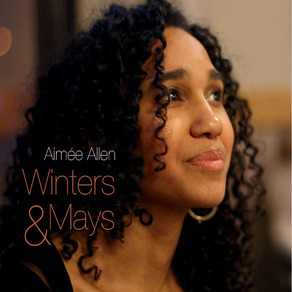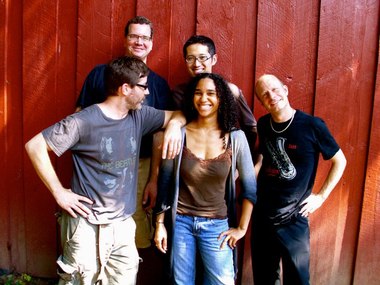
The song has a great history to it. It was Frishberg’s first recorded song. In a 1996 interview, Frishberg told Phillip D. Atteberry, "I worked for a short time with Dick Haymes and Fran Jeffries on the hotel circuit. Dick asked me to write something for Fran--a cute, sexy piece. He knew that I had been dabbling with composition. So I came up with Peel Me a Grape. She never performed it, but some of my friends liked it, so I submitted it to [composer and publisher Frank]Loesser’s office, and he published it. Nobody picked it up, however, so I assumed it had died in obscurity when I got a call to do a record date some months later. That was unusual. I was well connected in the night club circuit but played very few studio dates. At any rate, I showed up. An impressive group had assembled. Jimmy Crawford, Phil Woods, Clark Terry, Eddie Costa on vibes, plus a big band. Wow! John Hammond produced the thing. When I walked to the piano and saw the music, I saw Peel Me a Grape. My first reaction was, ‘Hey, what is this? I wrote a song called Peel Me a Grape!’ And then it hit me that they were recording my song. That’s why I had been called to play piano on the date. It was a thrill."
It was recorded beautifully by Lainie Kazan. It was done horribly by Dusty Springfield. Krall has staked her claim on it. My concerns were all proven to be unfounded. Aimée performs this song the way Frishberg intended it. She is playful, she is warm, she is charming.
Jacob Melchior adds superb brushwork on drums. His skittering brush on the snare is a cool feature. Toru Dodo’s piano work is supportive and cool. Craig Akin’s bass is so subtle that it is almost easy to miss what he adds. At 3:53 he does a small gliss that is subdued but a sweet touch.
The second track shifts to a samba but the crossover is seamless. Samba em preludio features the obligatory guitar and Peter McCann delivers smoothly. Victor Prieto’s accordion is not something expected and is welcome to the ensemble. Craig Akin gets the bass solo and he does it within the samba context brilliantly.
After Akin’s solo, guitar and accordion return and Prieto almost steals the show with his accordion work. We get to hear him on three tracks and he pays off every time.

Before listening to Aimée’s album, I got up to speed on her through various videos and recordings. Or so I thought. I was unprepared for a surprise element that caught me at the third track.
Eden Autumn& Noah Too begins with McCann’s solo electric guitar. It is an arpeggio of unexpected intervals with reminiscences of Steven Wilson’s compositions for Porcupine Tree. Intriguing from the start. Aimée and Akin join in together and the tension builds.
The title of the piece references her nieces and a nephew and Aimée delivers the lyrics in a hurried but not rushed tempo. She is quickly passing on wisdom to her little beloved ones while the piano and bass hold the slow tempo. The impact is powerful. The lives of the little ones are moving so slowly for them but aunt Aimée knows that it is all going fast and there is no time to waste.
The break picks up swingingly with great virtuosity by Pete McCann. The chord changes are captivating and her intonation is splendid. I was again called to think of Jon Anderson’s vocal style and concluded that, while I was listening to a ballad, it was a ballad of progressive rock proportions. I mean that in a good way.
After my first listen, I picked up the CD cover to look for the composer and was unprepared to find that it was composed by Aimée Allen. Now I was on the edge of my seat.
Stardust Reunited is also an Aimée composition. Toru Dodo carries the melody on piano beautifully and delicately. The lyrics are moving and inspiring and Aimée’s delivery blends a wistfulness with reverie all to magnificent effect.
Second Time Around is Aimée’s bossa nova composition and all of her musicians turn in first-rate interpretations of her intentions. The bossa’s aggressiveness is unleashed by Victor Prieto’s accordion and Aimée’s delivery punctuates the strength of the piece. The McCann guitar holds it together as Jacob Melchior provides the underlayment on drums.
I was stunned at the realization that the same heart and pen that created the “progressive-ballad” on one track had moved to a powerful bossa nova without seam and almost with a feeling of inevitability. These were not compositional jumps; they were progressions.
Aimée returns to standards with Bye Bye Blackbird/It Could Happen to You and the listener comes to the understanding that this performer is at home in any style from any place. She effortlessly moves about in these classics and her accompanists are equally agile. The exquisite meshing of these two songs is proof of her own tasteful understanding of them.
We Are in Love Again was written by Aimée’s brother David Allen. The crawling tempo of piano and drum is wrenching in their agonizing recollection of what had been as Aimée sings of what was and what is again. The very movement is intentionally tentative like lovers slowly returning to the place of inevitable vulnerability. The tempo and Aimée’s enunciation become more determined and they carry the mood brilliantly. Determination has replaced trepidation. Brilliant.
David and Aimée team up for the composing of That Day. David is a guitarist himself and the guitar part is subtle then virtuosic then supportive. I love the lyrics and I adore her emphasis.
There’ll be no need to explain/There‘s a turnaround
Nothing is ever the same/ When new love is found
’Cause when you fall/ The lessons learned don’t matter at all
You’ll find an irresistible call/Will carry you away
And you’ll know/That you’ve changed that day.
That call continues in the next track, another original entitled I’ll Get Along. The bluesy piece has touching moments from Craig Akin’s bass. Akin is better than you think. He is sublimely subtle. So subtle that a casual listen will allow you to miss what he is doing.

The magic of Aimée is such that while listening to her vocal version, the hearer forgets that anyone anywhere ever did a previous version of it. Then she follows up that magic with another spell cast on Sting’s Fragile. It must have been a spell that makes one forget an original version that was unliked. Again, she has taken the song as her own and she brings a freshness and delight that the original missed.
Aimée closes the album with Mancini and Bricusse’s Two for the Road. It is a fitting and emotional end to a wonderful album. Toru Dodo’s piano is haunting and Jacob Melchior is in lock-step with him. But it is Aimée who rightfully gets the listener’s attention over and over again.
Her track list is smart. Her instincts are perfect. Her delivery is astonishing.
As Aimée heads down her musical road, one truly wants to follow her wherever she leads. As the last notes of the soulful piano fade out and Aimée’s sweet voice has already echoed away, a deep longing sets in—a longing for her next album to be released soon.
 RSS Feed
RSS Feed
